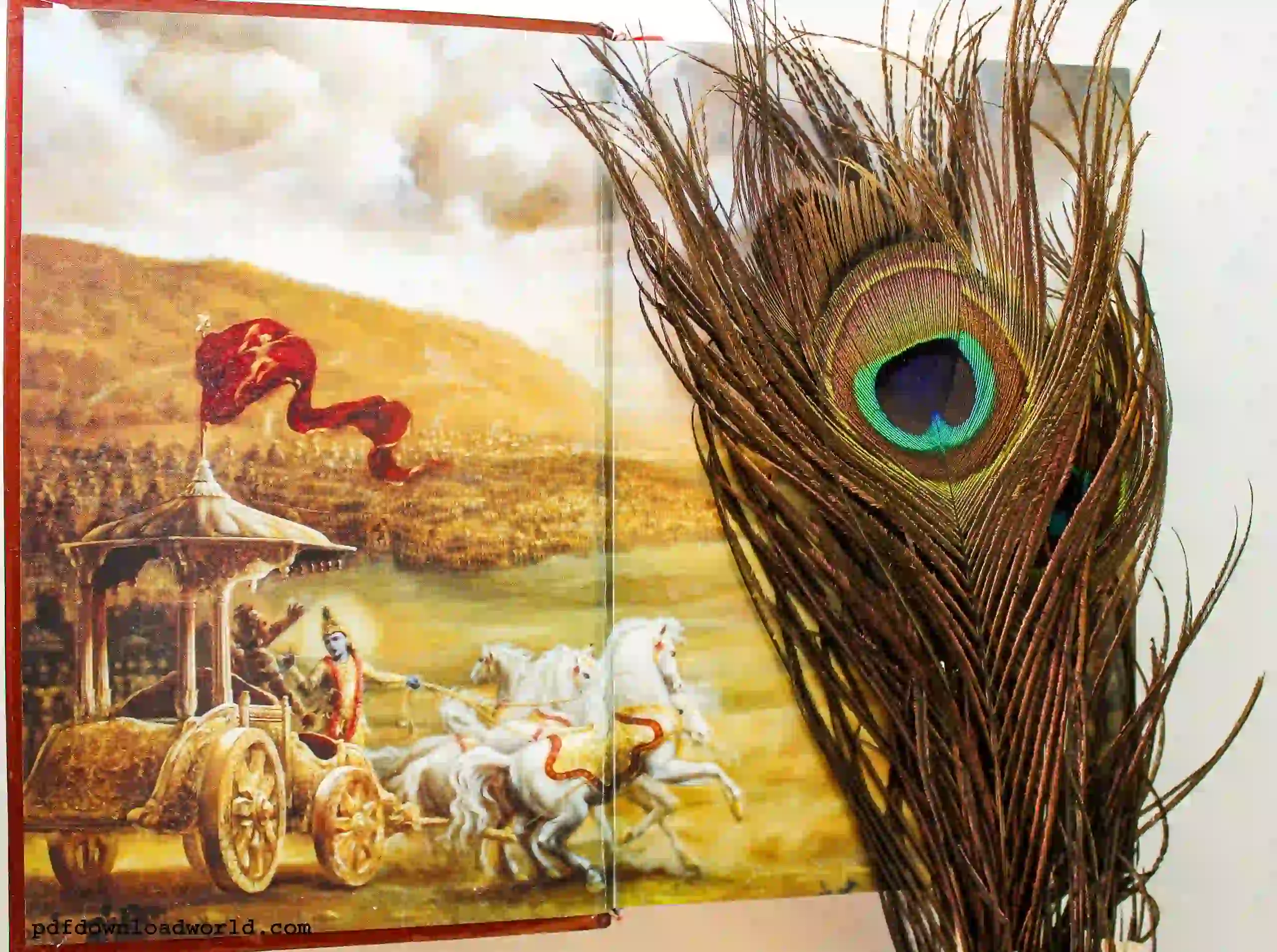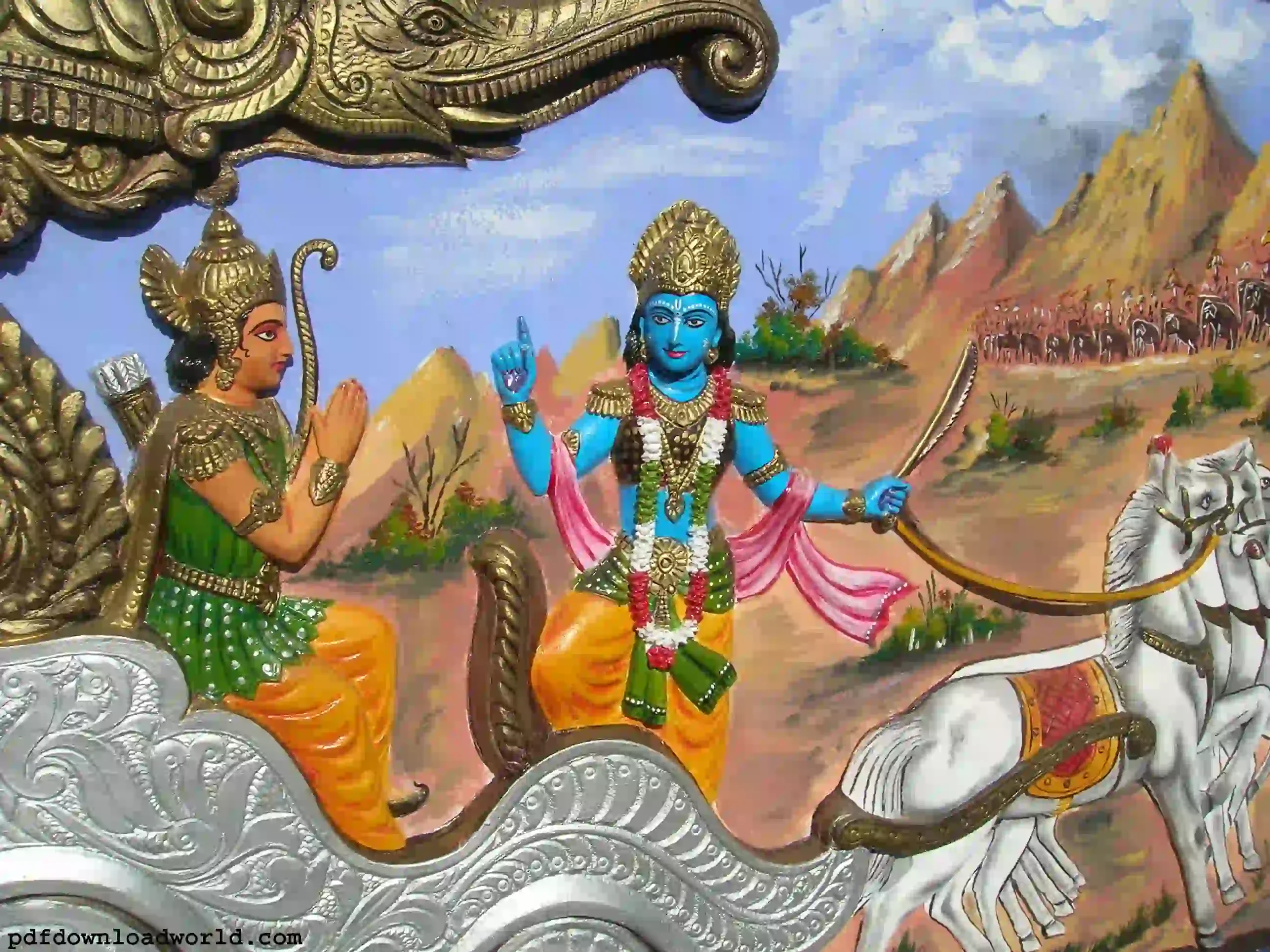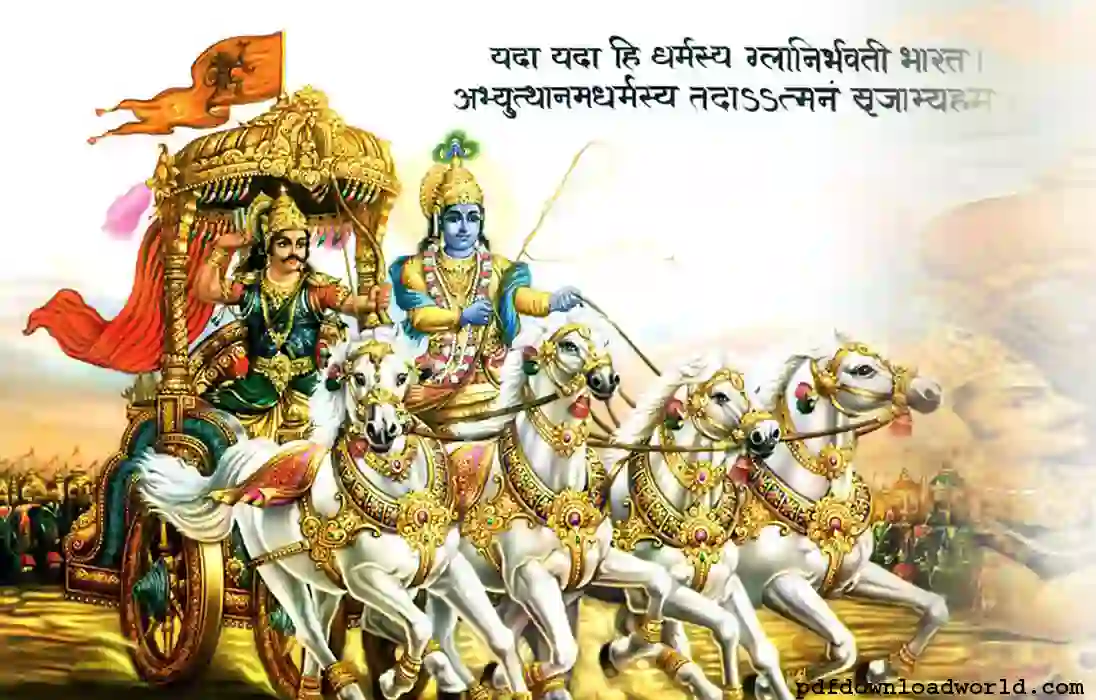Hello friends ! today we have brought Shrimad Bhagwat Geeta PDF in English for you. The Shrimad Bhagwat Geeta is an ancient and sacred Indian philosophical text of the Hindus. Lord Krishna preached the Gita to Arjuna in Kurukshetra at the time of the Mahabharata. Shrimad Bhagwat Geeta is an Upanishad given under Bhishma Parva of Mahabharata.
In this, monotheism, Karma Yoga, Gyan Yoga and Bhakti Yoga etc. have been explained very beautifully. Many of the teachings of the Upanishads, such as: Ashwattha Vidya regarding the nature of the world, Avyayapurush Vidya regarding the eternal unborn Brahman, Aksharpurush Vidya regarding Para Prakriti or Jiva and Ksharpurush Vidya regarding Apara Prakriti or the material world, etc., are in the Gita. .
Regular reading of Shrimad Bhagwad Gita keeps a person’s mind calm and he gets control over his mind, as well as increases self-confidence and develops positive energy in the body.
Here is the link to Shrimad Bhagwat Geeta PDF in English. From where you can easily Download Bhagwat Geeta In English PDF.
Shrimad Bhagwat Geeta PDF in English
At the time of the Mahabharata war, when Arjuna had refused to fight, Shri Krishna preached to him and informed him about the true knowledge of Karma and Dharma. These teachings given by Shri Krishna have been compiled in a book named “Shrimad Bhagwat Geeta”. It is part of the Bhishma Parva of the Mahabharata. There are a total of 18 chapters and a total 700 verses in Gita. Gita was preached about 4500 years ago (2175 BC) from today.
Shrimad Bhagwat Geeta is counted in departure trip, which also includes Upanishads and Brahma Sutras. According to Indian tradition, the place of Gita is similar to that of Upanishads and Dharmasutras and Upanishads have been called Gau (cow) and Shrimad Bhagwat Geeta as its milk. This means that the Gita accepts the spiritual knowledge of the Upanishads in its entirety.

The 18 chapters of Shrimad Bhagwat Geeta are as follows:
Chapter : 1 Arjun Vishadayoga
The name of the first chapter is Arjun Vishadayog. There are a total of 47 verses in this chapter. This chapter presents a unique theater of the preaching of the Gita. In the first chapter the two armies are described and in the usual way Arjuna explains his position to the Lord in the introduction.
Before the start of the war, Arjuna’s mind was suddenly attacked by a different kind of emotion Karpanya, after reaching the position obtained from the forceful Kshatradharma, due to which a strange kind of compassion filled Arjuna’s mind and Arjuna’s Kshatra nature disappeared.
He turned away from his duty, for which he was committed. Arjuna was unable to decide whether to fight or take renunciation. Arjun was not able to understand what to do and what not to do. Due to reaching the extreme state of this attitude, he put aside his bow and arrows.
Seeing this condition of Arjuna, Shri Krishna came to know that Arjuna’s body is fine but Arjuna’s morale has broken even before the start of the war. Without morale this body cannot stand. Therefore, a Guru’s duty came in front of Shri Krishna.
Arjuna’s mind is, therefore, liberated by reason, by reason, by knowledge, by the discussion of action, of the nature of the universe, of the condition of life in it, by the introduction of the immaterial Purusha, the controller of both, and by the face-to-face vision of that supreme all-powerful Brahman. Shri Krishna’s aim was to do it.
Chapter : 2 Sankhyayoga
The name of the second chapter is Sankhya Yoga. There are a total 72 verses in this chapter. In this chapter, Sankhya Yoga, Karma Yoga and the qualities of a person with a stable intellect etc. have been explained in detail. Shri Krishna told that birth and death happen alternately.
Nature has fixed one religion for everyone since birth. In it the path of life, the power of action and the periphery of desires etc. everything comes. Can’t run away from it. Even if someone runs away, nature pulls him back.
In this way, the methods by which Lord Shri Krishna explained to Arjuna, the change or dimension of time, the permanence of the soul and his self-religion or nature, etc., he called it the wisdom of Sankhya. After this, even without asking Arjuna’s question, Shri Krishna has also described the wisdom of the path of Yoga.
Shri Krishna has said that the biggest fear for a Karmayogi person is that he gets trapped in the entanglement of the desire to get the fruit, he should avoid this entanglement and keep doing his work without desiring the result.
Chapter : 3 Karmayoga
The name of the third chapter is Karmayoga. There are a total of 43 verses in this chapter. In this chapter, the superiority of the one who does daily work, the necessity of Yajnadi Karma, the characteristics of the ignorant and the knowledgeable and the topic of cessation of work, etc. have been explained in detail.
After listening to the explanation of Sankhya, in the third chapter, Arjuna asked Shri Krishna clearly to delve more deeply into the subject called Karmayoga, which of these two paths do you consider better and why not say with certainty that I Which of these two should I adopt? On this subject, Shri Krishna replied equally clearly that there are two principles or life-views in the world – Jnana Yoga for Sankhyaists and Karma Yoga for Karmaargis.
In this world, no person can leave the work and if he leaves, then nature forces the person to do the work with the effect of all the three gunas. Shri Krishna says that there is a doubt towards those who refrain from doing work that they leave the work on top but they remain immersed in it. This situation is intolerable and this situation has been called falsehood by Shri Krishna in Shrimadbhagwadgita. The simple human way is to act by restraining your senses in your mind.
Chapter: 4 Jnanakarma Sannyasyoga
The name of the fourth chapter is Jnanakarmasannyasayoga. There are a total of 42 verses in this chapter. In this chapter, the description of Karma, Akarma and Vikarma, the form of Yagya and the description of Gyan Yagya etc. have been explained in detail. In this chapter, it has been told that after attaining knowledge, the fruit of renunciation of actions can be obtained even while performing actions.
Lord Krishna tells that I first gave this knowledge to Lord Suryadev. After this it proceeded through the Guru tradition. But now it has almost disappeared. I am going to share this knowledge with you now. Arjun asks how did you say this to Surya? You were born recently. Then Shri Krishna has said that you and I had many births but you do not remember, but I remember.
Shri Krishna says that whenever there is loss of religion and increase of unrighteousness, then I incarnate as a human to protect the saints, for the destruction of evildoers and for the establishment of religion.
Chapter : 5 Karmasanyasa Yoga
The name of the fifth chapter is Karmasanyasayoga. There are a total of 29 verses in this chapter. In this chapter, Shri Krishna has described in detail about Karmayoga and Sadhu Purush etc. In this chapter, special attention is paid to the samskara or purification of the mind in its relation to karma.
Along with this, it has also been said that there is no difference between Yoga and Sankhya after reaching the higher ground. If you walk on any one path in the right way, then you get the same result. He also tells that I reside equally in every living being of the universe. Therefore, the creature should always be equanimous.

Chapter: 6 Atamsanyamyog
The name of the sixth chapter is Atamsanyamyog. There are a total of 47 verses in this chapter. In this chapter, Shri Krishna has described in detail about self-control. Restraint of the senses out of all the subjects, here is the essence of action and knowledge. The same state of mind in happiness and sorrow of a person is called Yoga.
Chapter: 7 Gyan Vigyan Yoga
The name of the seventh chapter is Gyan Vigyan Yoga. There are total 30 verses in this chapter. In this chapter, Shri Krishna has described in detail about self-control. In this, many forms of God have been mentioned, which have been further elaborated in the tenth chapter called Vibhutiyoga.
Along with this, there is also a description of special Bhagwati Drishti, whose formula is- “Vasudev: Sarvmiti”, that is, there is only one deity present in all Vasus or bodies, whose noun is Lord Vishnu.
In this context, from the point of view of science, Geeta has given a definite explanation of Apara and Para Prakriti. There are eight elements present in Apara Prakriti. These eight elements are present in the egg from which a human being is born. In this, the consciousness that comes by coming in contact with the effort of God is called Para Prakriti. Together with these eight elements, life becomes the ninth element.
Chapter: 8 Aksharbrahma Yoga
The name of the eighth chapter is Akshar Brahma Yoga. There are a total 28 verses in this chapter. The study of letters has expanded in the Upanishads. The essence of this Akshar Vidya in Gita is that Akshar Brahma Param means Akshar is the noun of Parabrahma. Spirituality is the name of the joint creation of humans, that is, soul and body. Jiva is the noun of combined physical body and only the noun of Shakti element is Adhidevak.
The way these three powers work together within the body, Jiva, Ishwar and Bhoot, is called Adhiyagya. The form of these six definitions has been expressed by the Gitakar in two verses. In the words of the Gita, Om is the monosyllabic Brahman.
Chapter : 9 Rajavidyarajaguhyayoga
The name of the ninth chapter is Rajvidyarajguhyayoga. There are a total of 34 verses in this chapter. According to this, this spiritual knowledge is Vidyarajni and this secret knowledge is the best. One meaning of the word king is mind. Therefore, Rajvidya is the only way to make the divine powers of your mind divine.
Chapter: 10 Vibhuti Yoga
The name of the tenth chapter is Vibhutiog. There are a total of 42 verses in this chapter. In this chapter it has been told that all the deities in the world are forms of the same Lord and all the qualities and demerits of human beings are forms of the power of the Lord. In this world, some are worshiping Peepal trees, some are worshiping rivers or the sea, some are worshiping fish, turtles etc. living in them and some are worshiping mountains.
There is no end to how many gods there are in this world. This abundance of gods is found everywhere in the history of this world. The Bhagwats, considering their power, have considered everyone as the form of Lord Vishnu. This is called Vibhuti Yoga.
Chapter: 11 Vishwaroopdarshan Yoga
The name of the eleventh chapter is Vishwaroopdarshan Yoga. There are a total 55 verses in this chapter. In this chapter, Arjuna has seen the universal form of the Lord. The meaning of the great form of God is that the living creation law of the infinite universe, which is above the human surface and periphery, is its visible vision.
The four-armed form of Lord Vishnu is gentle on this human plane. When Arjun saw the great form of Lord Vishnu, the words ‘Disho na jaane na labhe cha sharm’ came out of his mouth in panic and he prayed to Lord Vishnu that the natural condition that God has kept for human beings, the same for him. are sufficient.
Chapter : 12 Bhakti Yoga
The name of the twelfth chapter is Bhakti Yoga. There are a total of 20 verses in this chapter. It is worth knowing that by knowing this man attains supreme bliss, that is, that God is the truth.
Chapter : 13 Kshetra-Kshetragya Vibhagyoga
The name of the thirteenth chapter is Kshetra-Kshetragya Vibhagyoga. There are a total of 34 verses in this chapter. This chapter deals with the subject of the field and the idea of the fielder. This body of a man is the field and the soul who knows it is the knower of the field.
Chapter : 14 Gunatrayavibhagyoga
The name of the fourteenth chapter is Gunatrayavibhagyoga. There are a total 27 verses in this chapter. This topic of this chapter is the essence of all Vedic, philosophical and mythological philosophy. In this there are many interpretations of the three qualities called Sattva, Raja and Tama.
The equilibrium of qualities has been named Pradhan or Prakriti. Sattva guna is always stable like pure light with a calm nature and Tama guna also always remains motionless. But Rajogun present in between these two pulls them to the ground of effort. The name of the element of motion is Rajas.
Chapter: 15 Purushottama Yoga
The name of the fifteenth chapter is Purushottama Yoga. There are a total 20 verses in this chapter. In this chapter, the world has been described very beautifully in the form of Ashwattha. There is no end to this world in the form of Ashwattha with great expansion in space and time. But the origin or center of this vertical is Brahman only.
According to the Gita, there is no greater mystery than Vaishvanara or Pranamayi Consciousness. Nar or Purush are three – Kshar, Akshar and Avyaya. The name of the five elements is Kshar, the name of Prana is Akshar and the noun of mind or consciousness is called avyaya. Human consciousness is born from the combined state of these three males, this is what the sages have called Vaishwanar Agni.
Chapter : 16 Daivasursampadvibhagyog
The name of the sixteenth chapter is Daivasurasampadvibhagayoga. There are total 24 verses in this chapter. In this chapter the department of Devasur property has been explained. According to this, this world has been imagined in the form of divine and demonic power in Rigdev from the very beginning.
This is the imagination of the dual opposite form of this world that one is good and the other is bad, one is in light and the other is in darkness, one is immortal and the other is mortal and one is true and the other is false.
Chapter : 17 Shraddhatraya Vibhagyoga
The name of the seventeenth chapter is Shraddhatraya Vibhag Yoga. There are total 28 verses in this chapter. This chapter is concerned only with these three gunas named Sat, Raj and Tama, that is, in which guna is present, his faith or loyalty in life becomes like that guna. Yagya, penance, charity and karma are all governed by three types of devotion and even the diet is also of three types. Their differences and symptoms have been explained here in the Shrimad Bhagwat Geeta.
Chapter : 18 Moksha Sannyasa Yoga
The name of the eighteenth chapter is Mokshasannyasayoga. There are total 78 verses in this chapter. This chapter contains the essence and epilogue of all the teachings of Shrimad Bhagwat Geeta. Here again the importance of three qualities for human life has been said.
None of the gods in heaven and humans on earth is free from these three modes of nature. Man should walk very carefully so that he can save his intellect and instinct from evil and can recognize what is action and non-action. That is the true achievement of Sattvic intelligence and human, which properly identifies religion and unrighteousness, instinct and retirement and bondage and salvation.
In the end Sri Krishna has said that one should believe in and experience the one who is called God, who is sitting in the heart or center of every living being, following all the practices of this world with truth. This is the source of the supreme joy of life.

You can easily Download Shrimad Bhagwat Geeta In English PDF by clicking on the download button given below.
Conclusion: Hope you have liked this post and must have been very beneficial for you, so definitely share this post with your friends. The language of Shrimad Bhagwat Geeta PDF in English given above is very simple and esoteric. Simple sentences have been used while explaining in this Shrimad Bhagwat Geeta PDF in English. If you are facing any problem in downloading Shrimad Bhagwat Geeta In Hindi PDF or you need any other PDF, then you can tell us by commenting.
You May Also Like This :
- Shrimad Bhagwat Geeta In Hindi PDF Download | गीताप्रेस द्वारा प्रकाशित Best Shrimad Bhagwat Geeta in Hindi PDF Download
- Rich Dad Poor Dad PDF Free Download | Rich Dad Poor Dad Book PDF Free Download
- Rich Dad Poor Dad In Hindi PDF | Rich Dad Poor Dad PDF Free Download In Hindi
- हनुमान चालीसा : Hanuman Chalisa Pdf | Hanuman Chalisa In Hindi | Hanuman Chalisa All Language Pdf Download | Top 9 Language Hanuman Chalisa Pdf
FAQs: Shrimad Bhagwat Geeta PDF in English FAQs
Q : What is the benefit of reading Shrimad Bhagwat Geeta?
Ans : The person who reads Bhagwat Gita regularly, his mind always remains calm and he gets control over his mind, the person’s work, anger, greed, attachment etc. go away, the person has the knowledge of truth and falsehood, good and bad. There is understanding, self-confidence is strong, fear, fear goes away and positive energy develops in the body.
Q : How should Shrimad Bhagwat Geeta be read?
Ans : In the morning, there is peace and positivity in our mind, brain and atmosphere, so early morning is considered the best time to read Shrimad Bhagwat Geeta. The recitation of Gita should always be done after bath and with a calm mind, while reciting the Gita one should not talk here and there, nor should one get up again and again for any work in between.
Q : Which is the most important chapter of Gita?
Ans : The tenth chapter is considered the most important chapter of the Gita because this chapter contains the essence and epilogue of all the teachings of Shrimad Bhagwat Geeta. Here again the importance of three qualities for human life has been said.
Q : What is the biggest sin according to Gita?
Ans : The greatest sin according to the Gita is “Animal Killing”. Also, unnecessarily cutting green trees is also a sin.

Hello there, just became aware of your blog through Google, and found
that it’s really informative. I am going to watch out for
brussels. I’ll be grateful if you continue this in future.
Lots of people will be benefited from your writing.
Cheers! Escape room